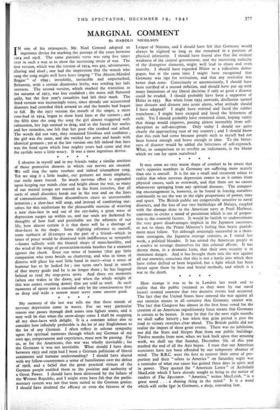My memory of the last war tells me that these
moods of nervous depression come in waves. For no very particular reason one passes through dark zones into lighter zones, and it may well be that when the snow-drops come I shall be snapping all my shoe-laces with delight. It is a constant solace also to consider how infinitely preferable is the lot of any Englishman to the lot of any German. I often reflect in solemn sympathy upon the spiritual torments through which any German of my own age, temperament and experience, must now be passing. For us, as for the Americans, this war was wholly inevitable ; for the Germans it was not inevitable. What should I have done between 1933 and 1939 had I been a German politician of liberal sentiments and humane understanding? I should have shared with my fellow-countrymen a sense of humiliation over the defeat of 1918, and a belief that the great practical virtues of the German people entitled them to the position and authority of a Great Power. I should have been distressed by the failure of the Weimar Republic, and I might even have felt that the parlia- mentary system was not that most suited to the German genius. I should have doubted the efficacy or even the fairness of the League of Nations, and I should have felt that Germany would always be slighted so long as she remained in a position of physical inferiority. I should have feared also that the evident weakness of the central government, and the increasing audacity of the disruptive elements, might well lead to chaos and even anarchy. I should have regarded Hitler as a ridiculous dema- gogue, but at the same time I might have recognised that Germany was ripe for revivalism, and that any revivalist was better than none. Consciously or unconsciously, I should have been terrified of a second inflation, and should have put up with many limitations of my liberal doctrine if only so great a disaster could be evaded. I should probably have been a supporter of Hitler in 1933. But when from 1933 onwards, disillusion turned into distaste and distaste into acute alarm, what attitude should I have adopted? I might have resisted and faced the rubber truncheon ; I might have escaped and faced the bitterness of exile. Yet I should probably have remained silent, hoping vainly that things would improve, passing almost insensibly from self- deception to self-deception. Only today I should see quite clearly the approaching ruin of my country ; and I should know that this ruin had come because people such as myself had not been honest enough and brave enough in time. To the bitter- ness of disaster would be added the bitterness of self-reproach. What, in comparison to so terrible an indictment, is the blame which we can lay upon ourselves?
* * * *






















 Previous page
Previous page